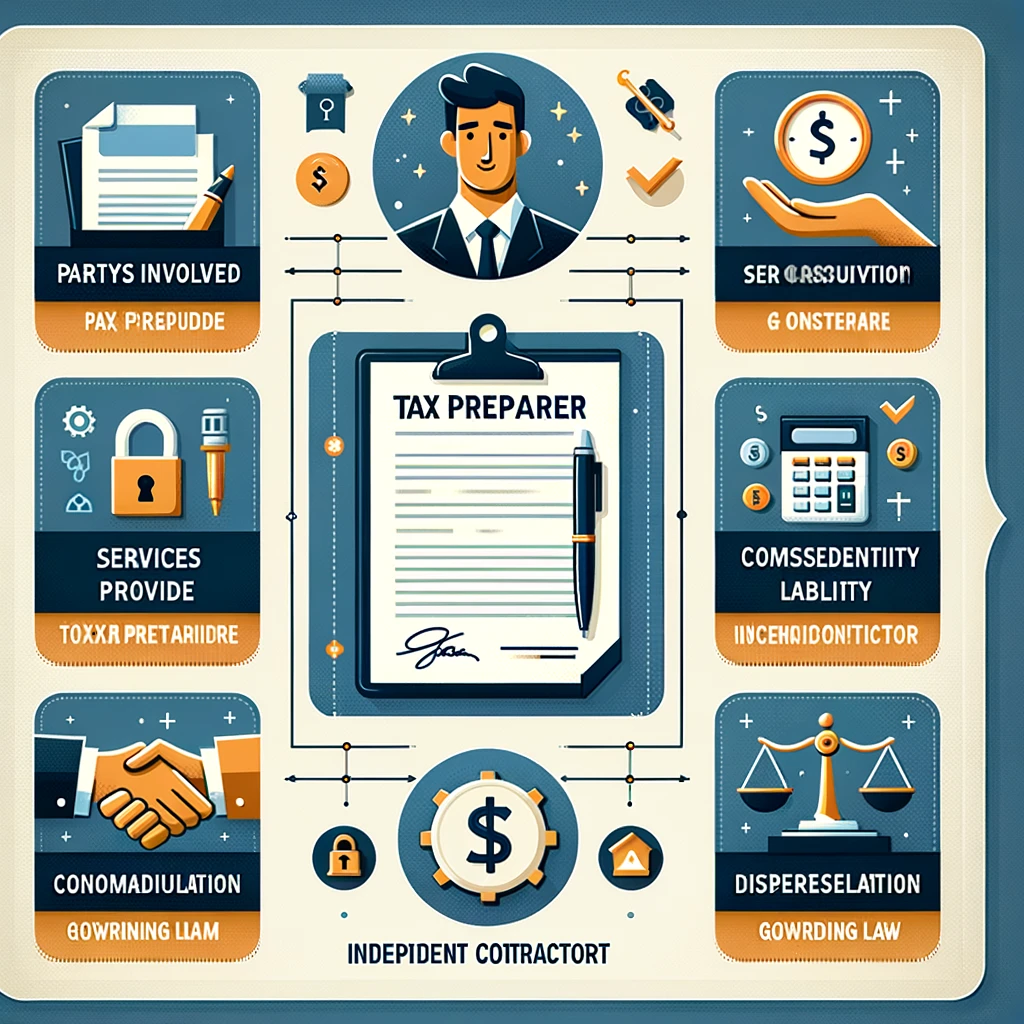Navigating Tax Preparer Independent Contractor Agreements: A Comprehensive Guide
In the evolving landscape of finance and taxation, the role of independent tax preparers has become increasingly significant. These professionals offer valuable services to individuals and businesses seeking assistance with tax preparation and planning. To formalize these relationships, a well-structured Tax Preparer Independent Contractor Agreement is essential. This comprehensive guide will navigate you through creating an effective agreement, ensuring clarity and mutual benefit for both parties involved.

Understanding the Importance of an Independent Contractor Agreement
An Independent Contractor Agreement serves as a legal document that outlines the terms and conditions of the working relationship between a service provider (in this case, a tax preparer) and their client. This agreement is crucial for several reasons:
Clarity of Role: It defines the tax preparer's scope of services, ensuring both parties have clear expectations.
Legal Protection: It provides legal protection for both parties if disputes arise regarding the services provided.
Financial Understanding: It outlines payment terms, ensuring the tax preparer is compensated for their services.
For further insights into the importance of such agreements, the U.S. Small Business Administration offers valuable resources.
Crafting Your Agreement: Key Components
1. Parties Involved
Clearly identify the names and contact information of both the independent contractor (tax preparer) and the client.
2. Services Provided
Detail the specific tax services to be provided. This could range from individual tax return preparation to business tax compliance and planning.
3. Duration of Agreement
Specify the start and end dates of the agreement. If the services are ongoing, outline the terms for termination by either party.
4. Compensation and Payment Terms
Define the fee structure for services rendered (e.g., hourly rate, flat fee) and payment terms, including due dates and acceptable payment methods.
5. Confidentiality Clause
To protect sensitive financial information, include a confidentiality clause that binds the tax preparer to keep all client information private.
6. Liability and Indemnification
Address liability issues, specifying the extent to which the tax preparer is liable for errors in tax preparation and the indemnification process if the client incurs penalties or fines.
7. Independent Contractor Status
Clarify that the tax preparer is an independent contractor, not an employee, affecting tax liabilities and benefits. The IRS provides guidelines distinguishing between independent contractors and employees.
8. Dispute Resolution
Outline the agreed-upon method for resolving any disputes related to the agreement, whether through arbitration, mediation, or legal action.
9. Amendment and Termination
Describe the process for any amendments to the agreement and terms under which the agreement can be terminated by either party.
10. Governing Law
Indicate the state laws that will govern the agreement. This is particularly important for tax preparers who serve clients in multiple states.
Best Practices for Implementation
Customization: Tailor the agreement to fit the specific needs and services offered. Generic contracts may not adequately cover all aspects of the tax preparer-client relationship.
Professional Review: Consider having the agreement reviewed by a legal professional to ensure it complies with state laws and adequately protects your interests. LegalNow AI, a platform offering legal services tailored to small businesses, can be a valuable resource for this purpose.
Clarity and Transparency: Ensure that the language used in the agreement is clear and understandable to avoid misunderstandings. Transparent communication about each clause can build trust between the tax preparer and the client.

Create & Review Your Contracts 10x Quality and Ease
Lawyer-level AI handles all your contract needs, with real lawyers providing safeguarding support

Conclusion
A well-crafted Tax Preparer Independent Contractor Agreement is fundamental to a successful and legally sound professional relationship. By incorporating the key components and following best practices outlined in this guide, tax preparers can safeguard their interests and foster positive working relationships with their clients. Remember, the goal of the agreement is not only to protect legally but also to establish clear expectations and promote a professional bond based on trust and mutual respect.
For additional information and resources on creating independent contractor agreements, consider exploring educational content from reputable sources such as Cornell Law School’s Legal Information Institute or the American Institute of CPAs (AICPA).

